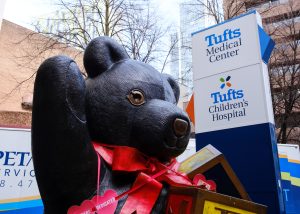It’s a Start
February 18, 2008
var uslide_show_id = “44ce5dff-aed7-45f1-96d7-ef7bede3a9b0”;var slideshowwidth = “468”;var linktext = “”;
This month, we celebrate many historic dates. We celebrate Abraham Lincoln’s birthday. We celebrate President’s Day. We celebrate Susan B. Anthony’s birthday. We even have the luxury of having an extra day in February this year. But what is most important this month is the 82nd annual celebration of Black History Month.
Everyone knows the story of Jackie Robinson, the man who broke the color barrier in baseball. He could have broken it here and been turning double plays with Johnny Pesky, but Tom Yawkey wouldn’t allow it.
After a while though, Boston had to do something about its “racist city” label and catch up with the times of Robinson and Arthur Ashe and realize, as Bob Dylan once famously wrote, “the times they are a-changin’.” Not only did they catch up; in some regards, they passed everybody in the HOV lane and became a diverse, integrated city where African-American athletes wanted to play.
This dramatic change over happened after 1945 when Jackie Robinson and two other Negro League players were denied the chance to even try out for the Red Sox.
But while Tom Yawkey made racial progression harder, the Boston Celtics and owner Walter Brown did their part to be the pioneers of the movement. Starting in 1950, the Celtics became the first NBA franchise in history to draft a black player, Chuck Cooper. They then became the first team to have an all-black starting line-up and the first team to have a black head coach.
All of this, writes L.A. Times and ESPN.com columnist J.A. Adande in an ESPN.com story from 2007, made the Celtics unknown integrators of the sporting world. “While everyone knew the role the Dodgers played in integrating baseball, most people didn’t realize the Celtics were the Dodgers of basketball, the Texas Western of pro hoops.”
After the Celtics started the movement in Boston, the Red Sox and Bruins finally started coming around.
In 1958, a legally blind Willie O’Ree stepped on the ice as both the first African-American Bruin and first African-American in the NHL. His debut was in a win over the hated Montreal Canadians, but he wasn’t even the head line of the story. Kevin Paul Dupont, a hockey writer for The Boston Globe, quoted O’Ree in a recent story, saying, “The big write-up was, ‘Bruins shut out Habs,'” recalled O’Ree. “Nothing really mentioned about Willie O’Ree breaking the color barrier. It wasn’t until I was called back [to Boston for the 1960-61 season] that the media said ‘Oh, there’s Willie O’Ree – he’s the Jackie Robinson of hockey.'”
Fifty years later, O’Ree was finally recognized for his accomplishments. O’Ree was honored by the Bruins during their game against the New York Rangers back on January 19. In the same Dupont story, Dick Johnson, curator of The Sports Museum of New England was quoted as saying: “On the roster of all-time Bruins, Willie’s name falls between Terry O’Reilly and Bobby Orr. More importantly, though, I feel his name falls between that of Arthur Ashe and Jackie Robinson.” The museum currently has an exhibit commemorating O’Ree’s ground-breaking achievement.
Shortly after O’Ree made his presence felt in the NHL, the Boston Red Sox followed suit and made more history (if you want to call it history).
In 1959, the Red Sox became the last team in the then 16-team league to integrate. They called up infielder/outfielder Elijah “Pumpsie” Green and made ominous history. Green played four seasons for the Sox and started a trend that was destined to continue. In a Boston.com article by Jon Goode, Green remembers all of the emotions he went through. “It was exciting, scary, and I went through a lot of changes, especially on the way to Boston.”
Soon after Pumpsie made his debut, the Sox brought up another African-American – pitcher earl Wilson – to help stabilize a then lackluster pitching staff. Wilson made history of his own in 1962, becoming the first black American League pitcher to throw a no-hitter. Paul Harber, in a Boston Globe article from 2005, wrote “[d]espite racial epithets and biased management, Mr. Wilson emerged to become one of the best Sox players on teams that struggled to reach mediocrity.” Wilson was also the first black baseball player to have an agent represent him in contract negotiations.
All of these steps in the right direction are great moments in history. They show us as fans, and as a society, that positive change can happen.
On February 1, Celtics players Leon Powe, Glen Davis and Brian Scalabrine hosted students from the Middle School Academy in Dorchester in an attempt to further educate them on Black history, Celtics history, and the contributions of African-Americans. For some time now, the Celtics have made it a point to reach out to the children of Boston and its surrounding towns and educate them.
Recently, Bill Russell made a trip to Fenway Park to commemorate the birthday of Jackie Robinson in a tribute made to “atone for the debts owed to the black athletes who’ve often competed on unlevel playing fields in Boston,” a Boston Globe editorial recently said. The piece also mentions O’Ree and his appointment in 1996 as the youth ambassador for the NHL’s Diversity Task Force.
Don’t for one second be fooled, though. The fight is not won, and frankly, it will probably never be won. There will always be polarization and double-standards. There will always be people fighting for progression and peace, but there will also be people who sully the waters, pull the race card at every available juncture and, in turn, slow the progress that the Celtics, Bruins and every other sporting franchise in America’s storied history have made in the last sixty years.
Be happy with the progress, but not content.










































































